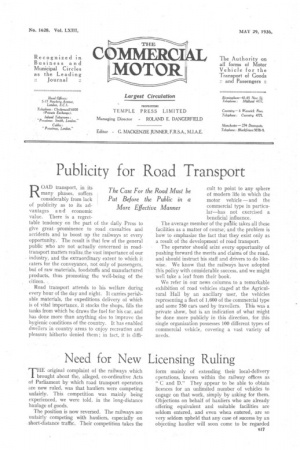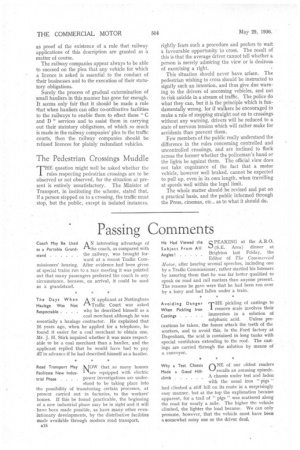Need for New Licensing Ruling
Page 31

Page 32

If you've noticed an error in this article please click here to report it so we can fix it.
THE original complaint of the railways which brought about the, alleged, co-ordinative Acts of Parliament by which road transport operators are now ruled, was that hauliers were competing unfairly. This competition was mainly being experienced, we were told, in the long-distance haulage of goods.
The position is now reversed. The railways are unfairly competing with hauliers, especially on . short-distance traffic. Their competition takes the form mainly of extending their local-delivery eperations, known within the railway offices as "C and D." They appear to be able to obtain licences for an unlimited number of vehicles to engage on that work, simply by asking for them. Objections on behalf of hauliers who are already offering equivalent and suitable facilities are seldom entered, and even when entered, are so very seldom upheld that any case of success by an objecting haulier will soon come to be regarded as proof of the existence of a rule that railway applications of this description are granted as a matter of course.
The railway companies appear always to be able to succeed on the plea that any vehicle for which a licence is asked is essential to the conduct of their businesses and to the execution of their statutory obligations.
Surely the process of gradual extermination of small hauliers in this manner has gone far enough. It seems only fair that it should be made a rule that when hauliers can offer co-ordinative facilities to the railways to enable them to effect these "C and D" services and to assist them in carrying out their statutory obligations, of which so much is made in the railway companies' plea to the traffic courts, then the railway companies should be refused licences for plainly redundant vehicles.
The Pedestrian Crossings Muddle
rTHE question might well be asked whether the rules respecting pedestrian crossings are to be observed or not observed, for the situation at present is entirely unsatisfactory. The Minister of Transport, in instituting the scheme, stated that, if a person stepped on to a crossing, the traffic must stop, but the public, except in isolated instances, rightly fears such a procedure and prefers to wait a favourable opportunity to cross. The result of this is that the average driver cannot tell whether a person is merely admiring the view or is desirous of exercising a right.
This situation should never have arisen. The pedestrian wishing to cross should be instructed to signify such an intention, and thus give due warning to the drivers of oncoming vehicles, and not to risk suicide in a stream of traffic. The police do what they can, but it is the principle which is fundamentally wrong, for if walkers be encouraged to make a rule of stepping straight out on to crossings without any warning, drivers will be reduced to a state of nervous tension which will rather make for accidents than prevent them.
Few members of the public really understand the difference in the rules concerning controlled and uncontrolled crossings, and are inclined to flock across the former whether the policeman's hand or the lights be against them. The official view does not take cognizance of the fact that a motor vehicle, however well braked, cannot be expected to pull up, even in its own length, when travelling at speeds well within the legal limit. The whole matter should be revised and put on a practical basis, and the public informed through the Press, cinemas, etc., as to what it should do.




























































































